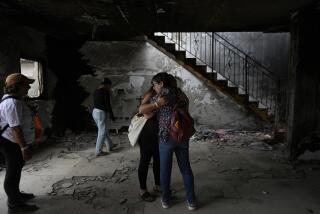An assault on the heart of Jerusalem
- Share via
JERUSALEM — There were no sirens, only the growl of a dozen idling ambulances and the buzz of several hundred people coming to grips with the worst terrorist attack in Israel in two years.
Outside Jerusalem’s Mercaz Harav yeshiva Thursday night, the mood seesawed between shock and growing anger. Well after midnight, more than 500 students, neighbors and onlookers gathered at the seminary’s green iron gates. Some craned their necks to catch a glimpse of the library doors, behind which authorities were still trying to identify the eight slain students.
For Israelis, the site of the massacre was almost as significant as the fact that it happened. Mayor Uri Lupolianski told Israeli radio that the attack took place in the heart of Jerusalem, both geographically and spiritually.
The targeting of the yeshiva, deep inside West Jerusalem in the quiet, heavily Orthodox Kiryat Moshe neighborhood, shattered a comparative sense of safety for Jerusalem residents.
“They wanted to hit our people where it hurts,” said Yaron Tzuker, a resident and volunteer paramedic who was one of the first to arrive on the scene.
Tzuker pointed out that to reach the school the attacker passed by dozens of restaurants, shopping centers and government buildings.
One of the oldest and most prestigious of Israel’s many seminaries, Mercaz Harav predates the modern state of Israel. Founded in 1925 by Rabbi Abraham Isaac Kook, perhaps the 20th century’s most revered Jewish theologian, the school has produced a steady stream of prominent religious, political and military leaders. It was at the forefront of supporting Jewish settlements in the West Bank and Gaza through the Gush Emunim (Bloc of the Faithful) movement.
A 2006 article in the newspaper Maariv described Mercaz Harav as the “mouth of the ideological volcano from which erupted the Gush Emunim movement and the entire settlement enterprise.”
In a television interview, Rabbi Moshe Klein, a yeshiva graduate and now one of its teachers, described the school as a “spiritual-ideological power station” whose students and faculty were still recovering from the loss of their revered leader, Rabbi Avraham Shapira, a former Israeli Ashkenazi chief rabbi who died several months ago.
The scene outside the yeshiva immediately became a rallying point for right-wing activists, many of whom expressed anger not only at the Palestinians, but also at the government of Prime Minister Ehud Olmert and the U.S.-sponsored peace negotiations.
Intermittent chants started up, including “Olmert should go to prison!” and “The blood of Jews is not worthless!” One man simply shouted, “Revenge!”
One of the chant leaders was Itamar Ben-Gvir, a prominent right-wing activist from Hebron, in the West Bank.
“The government doesn’t care about us. They take out Jews from their homes and give them to Arabs,” he said. “America is helping the Arabs kill Jews. If America wasn’t pressuring us to be gentle, we would kill them all.”
Among those who rushed to the scene was Nissim Zeev, a lawmaker with the right-wing Shas party, which has threatened to withdraw from Olmert’s government if he makes too many concessions in the negotiations. He called for an end to all contact with Palestinian Authority President Mahmoud Abbas, also known as Abu Mazen.
Abbas recently suspended negotiations to protest a bloody Israeli incursion into the Hamas-controlled Gaza Strip. He agreed to return to the table after meeting Wednesday with U.S. Secretary of State Condoleezza Rice, who is visiting the region. She called Thursday’s attack an “act of terror and depravity.”
Abbas also condemned the shootings, issuing a statement opposing any assault on civilians from either side.
As the crowd waited outside the gates for the bodies to be removed, Tzuker, the volunteer paramedic, recalled visiting the library several times. Compared with other places in Jerusalem, where metal detectors and even pat-downs are common, the seminary’s security was relatively casual.
“I think there’s maybe one security guard normally,” he said. “It’s not an army base. It’s a yeshiva.”
--
--
Batsheva Sobelman of The Times’ Jerusalem Bureau contributed to this report.
More to Read
Sign up for Essential California
The most important California stories and recommendations in your inbox every morning.
You may occasionally receive promotional content from the Los Angeles Times.










